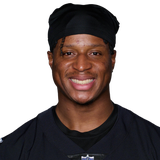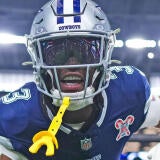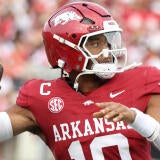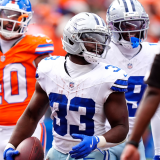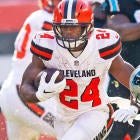2019 Fantasy Football Draft Prep: Running back tells revealed by Pro Football Focus grades
Pro Football Focus has experts grading every play of every game, and the results from last season can be surprising and illuminating for Fantasy players.
Todd Gurley the No. 18 running back last season? Ezekiel Elliott No. 23? David Johnson No. 51?
Pro Football Focus grades every player on the field on every play, and their grades often tell a much different story than we see on the RedZone.
Here are some of the highlights, maybe even revelations, from PFF's running back grades for 2018. They just might guide some of your draft decisions. After all, these evaluations fall much more in line with what football coaches see when they break down video than what we generally inhale as Fantasy fanatics.
We'll start this series with running backs, although PFF in an old-school nod refers to them as "Halfbacks." Haven't heard that terminology in a long time after it went the way of the Flanker and Split End.
Either way, there's some eye-opening stuff in their grading numbers that also go old-school 1-100.
| ||||||||||
The Cardinals back is still being drafted in the middle of the first round in Fantasy mock drafts we're doing, but you might want to look at some video before making that plunge. Yes, the offense was embarrassing last season in Arizona and should theoretically be much more productive under Kliff Kingsbury, but ...
Johnson graded No. 51 among running backs (63.8), earning his only respectable mark as a pass blocker (71.4). We can rationalize that by recognizing Arizona's offense was the league's worst. But Adrian Peterson graded out (76.8) as the 20th back playing in a dreadful Washington offense at age 33. Phillip Lindsay graded out 10th best working in a flat-lined Denver offense as a rookie. Frank Gore averaged 4.6 yards per carry for a 26th-ranked Dolphins offense at age 35.
Johnson, 27, averaged 3.6 per carry. He has had one brilliant NFL season in four, and 2016 feels like a long time ago. The Cardinals and Fantasy managers investing in him in Round 1 sure hope to somehow see that 2016 guy again this fall.
| ||||||||||
If you were the Cowboys, would you pay Zeke a max-type RB contract after his third season? The PFF grades would suggest no.
Elliott only graded out at No. 23 (75.7) among running backs for 2018, directly behind Peterson, Latavius Murray and Matt Breida (76.1). Amazingly, Peterson, Murray and Lamar Miller (No. 24) all received higher grades as pure runners.
To be real, however, and go beyond numbers, Zeke brings the kind of physicality, swagger and explosiveness that aren't so easily reflected in grades. So there's that.
| ||||||||||
Impressive Nick Chubb has lost some ground in the Fantasy world for this season only because the Browns signed Kareem Hunt (82.2 and No. 9 overall), who could complicate Chubb's workload when he returns from suspension for the second half of the season. But by then it's possible Chubb will have established himself as the best back in Fantasy.
As a rookie, Chubb received PFF's top running back grade of 87.4. He received only fair grades as a receiver and blocker but was the only back to get a 90-plus grade (90.2) as a pure runner.
Considering Chubb could be the focal point in one of the most exciting offenses for 2019, he could handily beat his second-round projections.
| ||||||||||
The Packers back earned a solid 81.1 grade, good for No. 12 among backs. Fantasy players love Jones because of his speed and big-play potential when he can stay on the field. But the grades show one other surprising reason to believe Jones could become entrenched as Green Bay's feature back -- he graded out as the No. 1 pass protector (87.6) among the top 40 backs. Who knew that? Probably Aaron Rodgers.
You know what's really weird? The best pass protection grade among the top 60 backs went to 5-foot-9 veteran Doug Martin (87.8 in pass protection but only No. 42 overall).
| ||||||||||
Undersized and undrafted out of the University of Colorado, Lindsay made an amazing splash as a rookie with his hometown Broncos. But when you look at his PFF grades, it was even more impressive.
Lindsay graded out No. 10 overall at 81.7, ahead of Aaron Jones (81.1), Damien Williams (80.9), Kerryon Johnson (80.9). Joe Mixon (78.3), Sony Michel (78.2), Gurley (78.2), Elliott (75.7), James Conner (73.0) and Dalvin Cook (72.9) among many bigger names. Lindsay graded out as one of the top pure runners (84.3), but maybe most impressively, as the fourth-best pass blocker (63.1) among the top-10 backs.
Underrate a guy with that kind of heart at your own risk on Draft Day.
| ||||||||||
Many in the Fantasy world seem to be shrugging off Henry's amazing performance last season. Granted, Henry was just a guy for much of 2018 before erupting in Weeks 13 and 14, but PFF's grades tell you to believe in him. Henry got the second best running back grade from last season at 87.0, including the second best grade as a pure runner (87.9) and one of the best as a pass protector (83.7).
Henry is still only 25 and has not been worn down from overwork. He could return major value, although less in PPR. He received a poor grade (48.4) as a receiver.
| ||||||||||
Early camp reports have not been favorable for Drake, who might already be behind Kalen Ballage in the running back competition in Miami. But the grades say neither of these guys is a great bet in Fantasy or reality.
PFF graded Drake as the No. 49 running back from 2018. Ballage, a rookie last year, was even worse in limited action, according to PFF. Drake got only fair grades as a runner (68.4), worse as a receiver (65.1) and one of the weakest pass blocking running-back grades (33.2) in the league. The Dolphins' new coach, Brian Flores of the Belichick coaching tree, figures to be a buttoned-up guy who won't be OK with those kinds of numbers, plus he has no allegiance to either guy.
It's no surprise then that Frank Gore put Drake and Ballage to shame last season, grading as the No. 11 back in the league at age 35. Mad respect to that tough dude. Canton awaits Gore (and his 14,748 rushing yards and 95 total touchdowns) if he ever stops playing.
| ||||||||||
Gus Edwards was a lot better than some of us remember last season, tying Damien Williams and Kerryon Johnson as the No. 13 back in the PFF grades at 80.9. However, the Ravens were apparently unimpressed, bringing in Mark Ingram as a free agent and drafting Justice Hill in the fourth round.
Ingram graded out at 79.3, just behind Edwards. What does this all mean for Fantasy? Might be more of a committee in Baltimore than we would like.
| ||||||||||
After an awful second NFL season, the No. 4 overall pick of the 2017 draft reportedly re-dedicated himself to being a peak version of Leonard Fournette. That's good, because he graded out as the No. 38 running back (69.9) in 2018 and was only available for eight games in a meltdown season in Jacksonville.
Worst of all, the 228-pound Fournette was one of the poorest pass protectors (37.4) in the league. But there is one surprising bit of good news for Fournette -- he graded surprisingly well as a receiver (77.8).
New Jags OC John DeFilippo projects to be more aggressive in the passing game with Nick Foles at QB, but only draft Fournette with your fingers crossed. He has missed 11 games in his first two seasons.
| ||||||||||
Conner was a great story as he stepped into Le'Veon Bell's void to help keep the Steelers offense humming, but he didn't grade particularly well on PFF at No. 27 overall (73.0). Conner graded just about the same as Zeke Elliott as a runner (75.7) but not so great as a receiver (64.0).
Those numbers could give you pause before selecting Conner in the first round, especially when you consider that the Steelers drafted Kentucky back Benny Snell in the fourth round in April and already have Jaylen Samuels, who graded at 70.1 as a rookie overall and 73.0 as a receiver.
| ||||||||||
One of the biggest red flags in the PFF grades points at Marlon Mack, who seemingly made a nice splash in his second injury shortened NFL season. Mack ran for 908 yards and nine touchdowns in 12 games and got a solid 78.0 grade as a runner. But on a Colts team that leans more to the passing game with Andrew Luck, his other numbers could be an issue.
Mack graded No. 36 overall at 70.3 but scored a dismal 33.0 as a receiver and got the worst grade in the top 60 as a pass blocker (29.6). Those numbers don't do much for job security, although the Colts went mostly defense and no running backs in the draft.
Mack's backfield mate, Nyheim Hines, earned a slightly better overall grade at 70.9 and put Mack to shame with a solid 70.1 grade as a pass blocker, Hines is 5-foot-9 and less than 200 pounds.
Bears backfield
It's not hard to see why the Bears moved on from Jordan Howard, who graded at No. 37 among backs at 70.1. The Bears picked up what looks like a bargain in Mike Davis for two years and $6 million. Davis ranked No. 25 overall (74.9) for his supporting role in Seattle's backfield rotation last season, seven spots better than new backfield mate Tarik Cohen (71.6).
Those numbers tell you not to assume -- as many seem to be -- that third-round pick David Montgomery will force Davis to the Bears' bench.
Eagles backfield
As for Howard in Philly, his grades weren't impressive as a runner (65.2) or as a receiver (63.8), but Carson Wentz will love him as a bodyguard. Howard graded out as the third-best pass blocker (86.3) among the top 60 halfbacks.
Howard might also get more run than we think in Philly because PFF gives other Eagles backs much worse grades -- Josh Adams (67.9), Corey Clement (59.1) and Wendell Smallwood (57.0) -- plus second-round rookie Miles Sanders figures to need some time to make an impact.
Niners backfield
You might want to curb your enthusiasm for Tevin Coleman, who posted pretty strong numbers as the top fill-in for Devonta Freeman in Atlanta in 2019 with nine total touchdowns. Before you assume he'll become the man in San Fran, note that he graded out as only the No. 46 back on PFF at 65.9.
If you only went with grades, Matt Breida would start for the Niners. He graded tied for No. 21 with Latavius Murray at 76.1. The undersized, tough, often beat-up Breida graded higher than any NFL back last season as a receiver (90.1).













